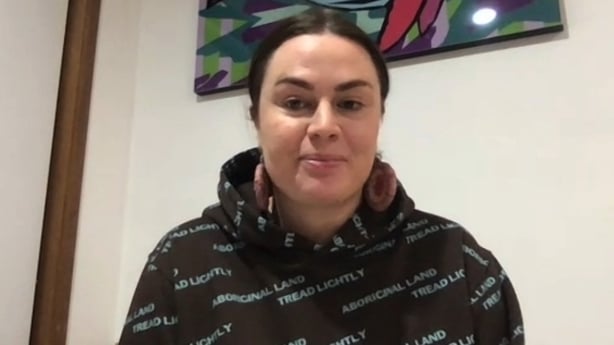A member of Australia's First Nations community has told Irish Travellers to keep fighting for a Government apology for the hurt and trauma experienced at the hands of the State.
Sissy Austin is a Gunditjmara, Keerray Wurrung, Peek Wurrung, Djab Wurrung First Nations woman and a community advocate for grassroots change in Australia.
Speaking via webcam from Australia, she told the National Assembly of Travellers that her father was one of the 'stolen generation'.
At 15 months old he was admitted to hospital by his mother with a suspected chest infection and kept overnight.
When she returned the next day, he was gone. He had been made a ward of the State and spent his childhood and early teenage years being shuttled from institutions to foster homes.
At the age of 16 he received a note in school with his mother's name on it and began searching.
Despite writing to the Australian government for his release, his grandmother did not see him again until he tracked her down.
They spent seven years together before she passed away.
Ms Austin said this is one of thousands of stories that were compiled as part of a national inquiry, culminating in a report called Bringing them Home.
That report included a recommendation to the government for an apology to those affected.
It took ten years of protests and rallies by indigenous communities in Australia before an historic formal government apology was made in 2008.
Sissy Austin expressed solidarity with the Traveller community who are fighting for an acknowledgement of the abuse and discrimination they suffered.
The questions posed by members of the national assembly of Travellers included whether there had been improvements in health, education, employment and training following the apology.
Sissy Austin said that while there were pockets of change, the racism was "shocking" in Australia which has impacted so much of the First Nations' health and wellbeing.
Similar to the Traveller community here, their life expectancy is a lot lower than non-indigenous.
"The list can go on", she said.

Ms Austin also said child protection laws in Australia are built on a colonial system and need to be abolished.
At the time of the apology in 2008, there were 9,070 children in government care. That figure has grown to 21,523, according to recent data.
"There are lots of different reasons why child protection will say why they're removing our children. A lot of those reasons come down to our people living in poverty," Ms Austin said.
"If there were space for us to self-determine our own lives, our people will say that we wouldn't be living in such a way that that sees systems such as child protection system controlling so many elements of our lives."
Asked if Aboriginal communities received reparations of any kind since the apology, Sissy Austin said the State of Victoria had recently announced one which she described as a "vigorous process".
She said her people do not have land rights or access to land to be able to heal and this is the core of who they are as First Nation people.
However, she said reparation could come from a treaty where land is returned.
Ms Austin said that while some Elders died with peace in their hearts thanks to the apology, sadly they had also died without reparation.
Today the first national assembly of Travellers convened by the Irish Traveller Movement to address a State Apology to the community in view of Government practices and policies implemented over decades.
They include policies that forced Travellers into housing, the separation and removal of Traveller children into care and institutions, the specific institutional abuses against Travellers in mother-and-baby homes, county homes, industrial schools and laundries, the establishment of Traveller segregated schools and classes, and the treatment of children in those settings.
They are calling for the State to "atone" for centuries old laws and practices which curtailed or prevented Travellers right to a way of life, culminating in the 1963 Commission of Itinerancy Report.
The Commission's objective was to enquire "into the problem arising from the presence in the country of itinerants' and 'to promote their absorption into the general community".
The report resulted in successive Irish governments working off the principles of assimilation, absorption and rehabilitation.
This, according to the Irish Traveller Movement, is linked to long-term systemic exclusion and discrimination.
The 1970 report on educational facilities for the children of itinerants it stated that "the educational needs of itinerant children are similar to those of backward children, generally aggravated by social disabilities and a vagrant way of life".
It recommended that special educational provision be made for Traveller children at primary level, which led to the establishment of five special Traveller schools and the creation of special Traveller classes in mainstream schools.
The ITM says the implementation of these policies and practices caused irrevocable damage across generations of Travellers, who left school early unable to read and write, and who were belittled in the practice of many of those schools and educators, as being less than and othered, resulting in chronically low education outcomes and poor life opportunities.
Today is the first meeting of Travellers to explore what an apology would look like and what corrective and restorative actions would make that apology meaningful.
Director of the Irish Traveller Movement Bernard Joyce said State recognition of their ethnic minority status in 2017 fell short of a state apology and recognition of the significant hurt and trauma caused to members of the community for decades.
"State sponsored Traveller segregation in education and forced assimilation, like other indigenous minorities across word, tell us that our culture and way of life was thought of as inferior," he said.
"Our story as Irish Travellers, and this part of Irish history has not been told, our voices unheard and undocumented, today marks a milestone to change that, so that we can move forward as a community and that our lives matter."







